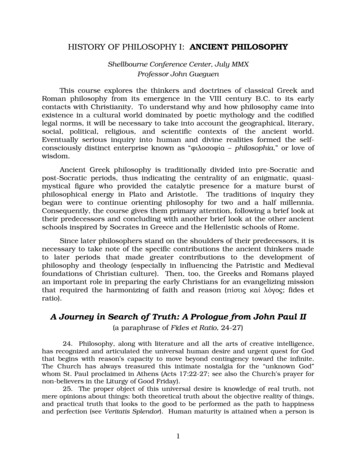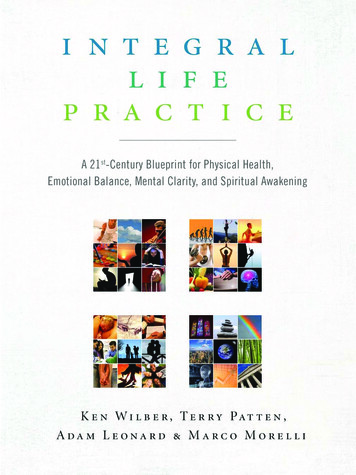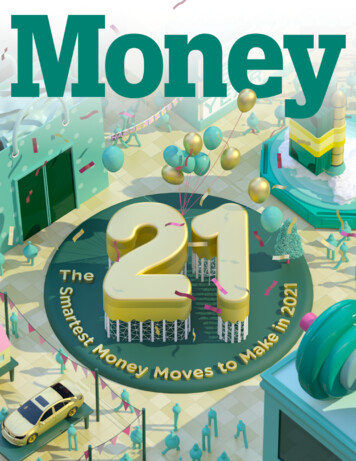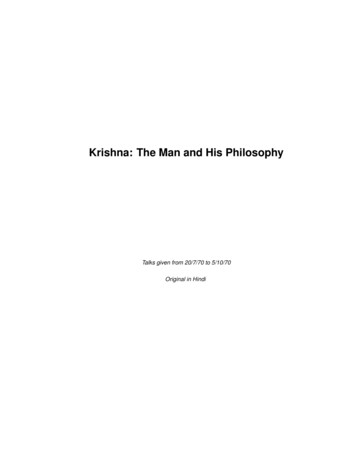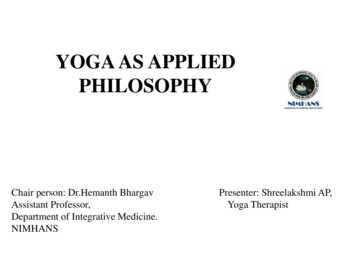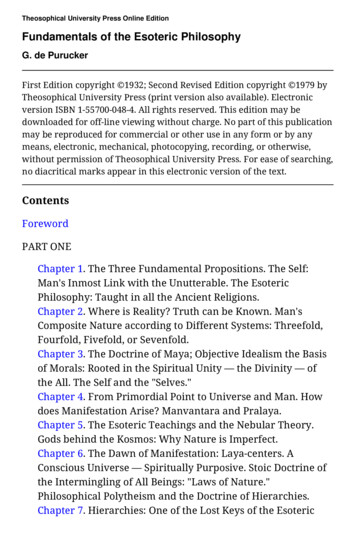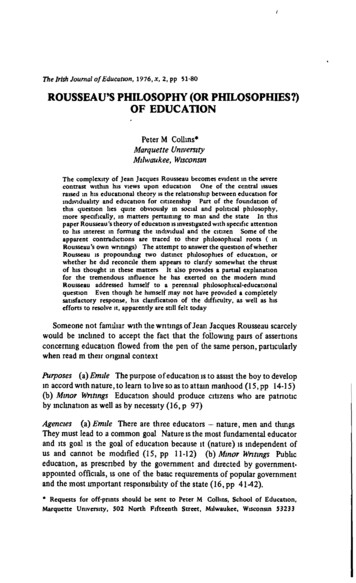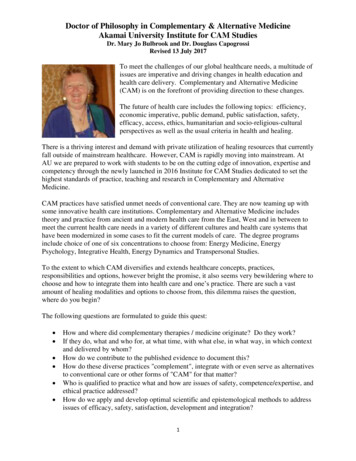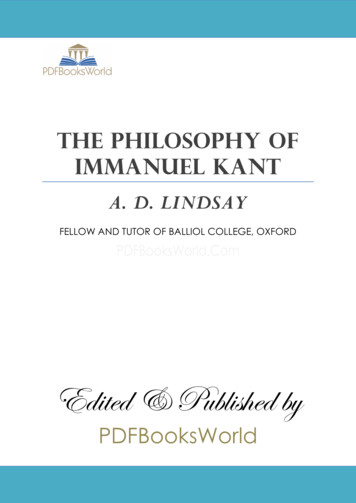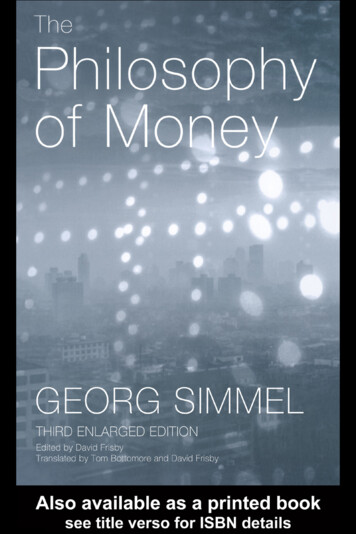
Transcription
The Philosophy of MoneyIn The Philosophy of Money, Georg Simmel presents a remarkable andwide-ranging discussion of the social, psychological and philosophicalaspects of the money economy. He provides us with a detailed analysis ofthe circulation and exchange of commodities, while considering therelationship of money to the human personality, the position of women,individual freedom and other key areas of human existence. Through thishe creates a series of brilliant insights into the forms which socialrelationships take and gives us a comprehensive analysis of theinterrelationships between the most diverse and seemingly unconnectedsocial and cultural phenomena.This pioneering work by Georg Simmel has increasingly been recognizedas an important and influential economic and sociological text. This editioncontains a substantial new preface by David Frisby, in which hereconsiders Simmel’s ideas and theories in the light of historical andcontemporary concerns.Georg Simmel (1858–1918) taught sociology and philosophy at theUniversity of Berlin for the greater part of his life. In 1914 he wasappointed to a chair at Strasbourg University, where he remained until hisdeath.The late Tom Bottomore was Emeritus Professor of Sociology at SussexUniversity.David Frisby is Professor of Sociology at Glasgow University.
The Philosophy of MoneyThird enlarged editionGeorg SimmelEdited byDavid FrisbyTranslated byTom Bottomore and David Frisbyfrom a first draft by Kaethe MengelbergLONDON AND NEW YORK
First published in l978by Routledge and Kegan Paul LtdSecond edition published in 1990by Routledge11 New Fetter Lane, London EC4P 4EEThird edition published in 2004by Routledge11 New Fetter Lane, London EC4P 4EESimultaneously published in the USA and Canadaby Routledge29 West 35th Street, New York, NY 10001Routledge is an imprint of the Taylor & Francis GroupThis edition published in the Taylor & Francis e-Library, 2005.“To purchase your own copy of this or any of Taylor & Francis or Routledge’scollection of thousands of eBooks please go to www.eBookstore.tandf.co.uk.” 1978, 1990, 2004 RoutledgeAll rights reserved. No part of this book may be reprinted or reproduced orutilized in any form or by any electronic, mechanical, or other means, nowknown or hereafter invented, including photocopying and recording, or inany information storage or retrieval system, without permission in writingfrom the publishers.British Library Cataloguing in Publication DataA catalogue record for this book is available from the British LibraryLibrary of Congress Cataloging in Publication DataA catalog record for this book has been requestedISBN 0-203-48113-5 Master e-book ISBNISBN 0-203-68069-3 (Adobe eReader Format)ISBN 0-415-34173-6 (hbk)ISBN 0-415-34172-8 (pbk)
ContentsAcknowledgementsxiiNote on the TranslationxiiiPreface to the Third EditionxivPreface to the Second EditionxlviIntroduction to the Translation1THE PHILOSOPHY OF MONEYPreface51ANALYTICAL PARTChapter 1Value and Money56I56Reality and value as mutually independent categoriesthrough which our conceptions become images of theworld56The psychological fact of objective value59Objectivity in practice as standardization or as aguarantee for the totality of subjective values61Economic value as the objectification of subjectivevalues, as a result of establishing distance between theconsuming subject and the object62An analogy with aesthetic value70Economic activity establishes distances and overcomesthem72II76Exchange as a means of overcoming the purely subjective 76value significance of an object
vIn exchange, objects express their value reciprocally77The value of an object becomes objectified byexchanging it for another object79Exchange as a form of life and as the condition ofeconomic value, as a primary economic fact79Analysis of the theories of utility and scarcity88Value and price: the socially fixed price as a preliminary 92stage of the objectively regulated priceIII99Incorporation of economic value and a relativistic world 99viewThe epistemology of a relativistic world view100The construction of proofs in infinite series and theirreciprocal legitimation102The objectivity of truth as well as of value viewed as arelation between subjective elements106Money as the autonomous manifestation of the exchange 117relation which transforms desired objects into economicobjects, and establishes the substitutability of objectsAnalysis of the nature of money with reference to itsvalue stability, its development and its objectivity120Money as a reification of the general form of existence 127according to which things derive their significance fromtheir relationship to each otherChapter 2The Value of Money as a Substance129I129The intrinsic value of money and the measurement ofvalue129Problems of measurement131The quantity of effective money135Does money possess an intrinsic value?140The development of the purely symbolic character ofmoney144
viIIRenunciation of the non-monetary uses of monetarymaterial150150The first argument against money as merely a symbol: 154the relations of money and goods, which would make anintrinsic value for money superfluous, are not accuratelydeterminable; intrinsic value remedies this deficiencyThe second argument against money as merely a symbol: 158the unlimited augmentability of monetary symbols;relativistic indifference to the absolute limits of monetaryquantity and the errors to which this indifference leadsThe supply of money160The reciprocal nature of the limitation that reality places 163on pure conceptsIII167The historical development of money from substance to 167functionSocial interactions and their crystallization into separate 169structures; the common relations of buyer and seller tothe social unit as the sociological premise of monetaryintercourseMonetary policy: largeness and smallness, diffusenessand concentration of the economic circle in theirsignificance for the intrinsic character of money171Social interaction and exchange relations: money’s173functions: its facilitation of trade, its constancy as ameasure of value, its mobilization and condensation ofvaluesThe nature of the economic circle and its significance for 179moneyThe transition to money’s general functional character 183Chapter 3The declining significance of money as substance190The increasing significance of money as value198Money in the Sequence of Purposes204I204
viiAction towards an end as the conscious interactionbetween subject and object204The varying length of teleological series207The tool as intensified means209Money as the purest example of the tool210The unlimited possibilities for the utilization of money 212The unearned increment of wealth217The difference between the same amount of money aspart of a large and of a small fortune219Money—because of its character as pure means—as221peculiarly congruent with personality types that are notclosely united with social groupsII228The psychological growth of means into ends228Money as the most extreme example of a meansbecoming an end232Money as an end depends upon the cultural tendencies 233of an epochPsychological consequences of money’s teleologicalposition235Greed and avarice239Extravagance248Ascetic poverty252Cynicism256The blasé attitude257III259The quantity of money as its quality260Subjective differences in amounts of risk261The qualitatively different consequences of quantitatively 263altered causesThe threshold of economic awareness265Differential sensitivity towards economic stimuli267
viiiRelations between external stimuli and emotionalresponses in the field of money270Significance of the personal unity of the owner272The material and cultural relation of form and amount 274The relation between quantity and quality of things, and 278the significance of money for this relationSYNTHETIC PARTChapter 4Individual Freedom283I283Freedom exists in conjunction with duties283The gradations of this freedom depend on whether the 284duties are directly personal or apply only to the productsof labourMoney payment as the form most congruent withpersonal freedom285The maximization of value through changes inownership292Cultural development increases the number of persons 295on whom one is dependent and the simultaneousdecrease in ties to persons viewed as individualsMoney is responsible for impersonal relations between 298people, and thus for individual freedomII304Possession as activity304The mutual dependence of having and being307The dissolving of this dependency by the possession of 308moneyLack of freedom as the interweaving of the mental series: 313this lack at a minimum when the interweaving of eitheris with the most general of the other seriesIts application to limitations deriving from economicinterests315Freedom as the articulation of the self in the medium of 322things, that is, freedom as possession
ixThe possession of money and the selfIIIDifferentiation of person and possession327332332Spatial separation and technical objectification through 334moneyThe separation of the total personality from individual 336work activities and the results of this separation for theevaluation of these work activitiesThe development of the individual’s independence from 343the groupNew forms of association brought about by money; the 345association planned for a purposeGeneral relations between a money economy and theprinciple of individualismChapter 5348The Money Equivalent of Personal Values357I357Wergild357The transition from the utilitarian to the objective and 359absolute valuation of the human beingPunishment by fine and the stages of culture365The increasing inadequacy of money368Marriage by purchase372Marriage by purchase and the value of women374Division of labour among the sexes, and the dowry376The typical relation between money and prostitution, its 378development analogous to that of wergildMarriage for money383Bribery387Money and the ideal of distinction392IIThe transformation of specific rights into monetaryclaims397397
xThe enforceability of demands400The transformation of substantive values into moneyvalues402The negative meaning of freedom and the extirpation of 403the personalityThe difference in value between personal achievementand monetary equivalentIII407412‘Labour money’ and its rationale412The unpaid contribution of mental effort414Differences in types of labour as quantitative differences 417Manual labour as the unit of labour421The value of physical activity reducible to that of mental 424activityDifferences in the utility of labour as arguments against 429‘labour money’: the insight into the significance ofmoney thereby affordedChapter 6The Style of Life433I433The preponderance of intellectual over emotionalfunctions brought about by the money economy433Lack of character and objectivity of the style of life436The dual roles of both intellect and money: with regard 438to content they are supra-personalThe dual roles of intellect and money: with regard tofunction they are individualistic and egoistic441Money’s relationship to the rationalism of law and logic 446The calculating character of modern timesIIThe concept of culture448450450The increase in material culture and the lag in individual 453cultureThe objectification of the mind457
xiThe division of labour as the cause of the divergence of 458subjective and objective cultureThe occasional greater weight of subjective culture468The relation of money to the agents of these opposingtendencies473III476Alterations in the distance between the self and objects 476as the manifestation of varying styles of lifeModern tendencies towards the increase and diminution 479of this distanceThe part played by money in this dual process482Credit484The pre-eminence of technology486The rhythm or symmetry, and its opposite, of thecontents of life491The sequence and simultaneity of rhythm and symmetry 494Analogous developments in money497The pace of life, its alterations and those of the money 504supplyThe concentration of monetary activity509The mobilization of values511Constancy and flux as categories for comprehending the 515world, their synthesis in the relative character ofexistenceMoney as the historical symbol of the relative character 517of existenceAfterword: The Constitution of the Text519Name Index540
AcknowledgementsThe first two chapters and part of the third chapter were translated by TomBottomore and the remainder by David Frisby. I would like to thank GlynAdey for supplying me with a draft translation of some sections of thepresent volume. Our greatest debt must be to the late Kaethe Mengelbergwho originally provided a draft of the whole volume. Without theassistance of this earlier work, it is doubtful whether the present translationcould have been completed. This translation is therefore dedicated to hermemory.I would also like to thank Pru Larsen for the onerous task of typing themanuscript in its final version. I am grateful to the Leverhulme Trust forawarding me a Faculty Fellowship in European Studies which enabled meto undertake the research for the introduction to this translation at theUniversity of Konstanz, and to Professor Horst Baier for his assistance inits preparation.David FrisbyGlasgow1978I am grateful for a grant from the Nuffield Foundation in 1987 whichenabled me to research some of the new editorial material at KonstanzUniversity. I also wish to thank Heinz-Jurgen Dahme and Klaus ChristianKöhnke for their assistance. Thanks also to Ann Adamson for typing theadditions to this edition.David FrisbyGlasgow1990I wish to thank Maureen McQuillan for typing the new preface to thisedition.David FrisbyGlasgow2003
Note on the TranslationThe translation contained in this volume is of the second, enlarged editionof Philosophie des Geldes, published in Berlin in 1907, and is identical tolater editions (3rd ed. 1920; 4th ed. 1922; 5th ed. 1930; 6th ed. 1958).Thefirst edition of the work appeared in 1900 and was somewhat shorter(pp. xvi
The Philosophy of Money In The Philosophy of Money, Georg Simmel presents a remarkable and wide-ranging discussion of the social, psychological and philosophical aspects of the money economy. He provides us with a detailed analysis of the circulation and exchange of commodities, while considering the relationship of money to the human personality, the position of women, individual freedom and .
